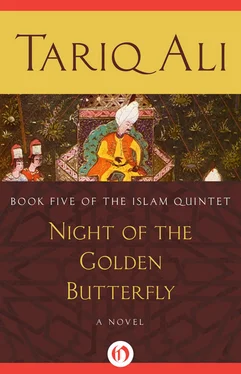I managed to conceal my joy.
‘With all of us leaving, the city of culture will be empty.’
We laughed at our own arrogance.
IN THE EARLY DAYS, my father would drive us there, spend a week, and then return to Lahore. The mountain routine in our household was well established. The servants would wake us up at three in the morning, when it was still pitch dark outside. My twin sisters, three years younger, and I would be placed half-asleep in the back of a ramshackle Chevrolet station wagon and by four at the latest my father would be driving northwards on the Grand Trunk Road, which had barely any other traffic at that hour. This was the reason for the pre-dawn departures, which felt like torture at the time. My sisters and I would wake again when the sun rose and wait for the inevitable stop at Wazirabad Junction Railway Station, where they served excellent scrambled eggs on toast, brewed a fine pot of tea and had relatively clean toilets. That was a very long time ago. Soon afterwards we would cross the mighty Jhelum and once again hear the story of how Alexander the Great had found the river too difficult to ford and almost lost his life. We came to know this tale so well that in the years ahead we would repeat it in unison as we approached the bridge, to pre-empt the parental version. The next stop was Rawalpindi, a brief halt to pick up chicken sandwiches and chilled coffee at the Silver Grill before the final stretch, which began on the tarmac road to Murree, the official hill station which my mother loathed because it was not Simla and was overcrowded with the ‘wrong sort’ of people — not counting Zahid and his family, of course, and the many other friends who spent the summers there. In my mother’s imagination Murree was Babylon, to be avoided even as a stopover on the way to our Arcadia.
Beyond Murree lay the rough road to the galis , the valleys between the Himalayan foothills, clothed in pines; soon after leaving the hill station the fragrance of these trees became overpowering. More than a hundred years ago, the British had come to the galis and built hill-cottages with quaint names like Kirkstone, Moonrising, Retreat, etc., to remind them of home. First we passed Khairagali, then Changlagali, then Doongagali, and on a ridge two miles above that lay Nathia, the queen of them all, with its own club and tennis courts and, most importantly, a library filled with books, mainly by authors one had never heard of before or never would again: the literary equivalent of B-movies and sometimes startlingly good.
Heaven in those days was arriving here, inhaling the scent of wild strawberries, sighting the snow-covered peak of Nanga Parbat in the Himalayan distance and wondering which of our summer friends had arrived.
This year, all I could think about was Jindié. When was she arriving? What day? What hour? I have scant memories of that time now, a time of unrequited passions that seemed to be the fate of our generation. To write the life of Plato I have to work hard to collect myself and remember what else happened that summer. It’s easier now, since my memories of Jindié have faded.
When we reached our summer house, the caretaker delivered a number of messages and handed me a scrap of paper. None of the messages were of any significance. Summer friends from Peshawar had already arrived, including two demon tennis players, Pashtun brothers, witty and easy mannered, who usually pulverized their opponents. Zahid and I had beaten them once and that was only because we could see better in the mist that enveloped the court. The note was from Younis, the jolly sub-postmaster who presided over the tiny post office in summer and stayed in the rest house below the bazaar. He wondered when we could meet for a cup of tea. The next day friends from Lahore and Karachi arrived as well. We met and exchanged pleasantries, but my thoughts were elsewhere.
My friends noticed how distracted I had become and assumed that as I was due to leave the country later that year, my mind had already departed and I found their company tiresome. How could I tell them all that I was suffering from love fever? There were also two young women present who were great fun because they never relapsed into coquetry and loathed bourgeois pettinesses and whose company, for those reasons, I enjoyed a great deal. I could only imagine their scathing comments if I admitted to anything that remotely resembled serious passion.
I walked alone to the Pines Hotel and exchanged greetings with the proprietor and staff. Soon after Partition, in 1947, when I was three and my sisters had not yet been born, we began staying at the Pines, and the proprietor, Zaman Khan, a tall, pot-bellied Pashtun with permanently bloodshot grey eyes — the result of an overfondness for the beer produced at the Murree Brewery by one of Jamshed’s more prosperous relatives — had become a familiar and friendly figure over the years. There was little that escaped him. He gave me a hug and immediately offered some information.
‘That green-eyed girl from Peshawar whom you liked so much last year is arriving next week with her mother.’
I feigned delight and then said in a casual tone, ‘A friend of mine, Hanif Ma, told me he was coming this year. They’re a Chinese family from Lahore.’
Zaman grabbed me by the arm and took me to his office. Together we looked at the reservations register. The Mas were due in two days.
‘I didn’t know you were friends. I’ll put them in the cottage where you stayed ten years ago. So I’ll be seeing more of you this year. Good. You know you can always eat here.’
‘Yes, but not in your dining room where you still serve those disgusting stews the English used to like.’
He pinched me and laughed. Thrilled by the news and on a high I walked down to the bazaar and met old friends, bought an off-white Chitrali hat and warmed my hands on a cup of delicious, if oversweet, mountain tea, a concoction made by boiling tea leaves in milk and sugar till the colour is exactly right. One of the most warming drinks in the world. When I walked into the post office, situated above a sloping ravine leading to the deep-valley villages below, where the local people lived throughout the year, I got a shock. Seated next to Younis the sub-postmaster was Plato. I’d completely forgotten that he was coming here this summer.
‘You didn’t know that we were old friends, did you?’ asked Younis. Younis and his mother had been in the same bus that took the refugees from Ludhiana and it was she who had looked after Plato till they reached the camp. Younis’s father, a night watchman working for a Hindu-owned factory in Ludhiana, had never been seen again. They had family in Peshawar, and Younis had matriculated and become a Grade 6 civil servant.
‘Grade 6’, said Plato, ‘is recognition that you will never rise in the service. Sub-postmaster for life.’
Younis roared with laughter. ‘Better than a peon. I just hope I can spend all my summers here till I die.’
It was barely noon. Younis offered me some locally fermented apricot liquor in my tea. I declined the pleasure, but both of them poured generous helpings into their own bowls. Some friends arrived to post letters and joined us for a while, till their sisters and mothers waiting outside shouted at them. Once they had left, Younis whispered, ‘I hear from Bostaan Khan that the girl from Peshawar will be here next week.’
Bostaan was an old waiter at the Pines, and a cardsharp. Why had they been gossiping about her?
‘Because of you.’
The previous summer I had made a fool of myself with Greeneyes and she had enjoyed snubbing me in public. One day I noticed her in a corner of the club avidly devouring a letter, obviously a billet-doux. Her white face turned deep red when she saw me.
Читать дальше












